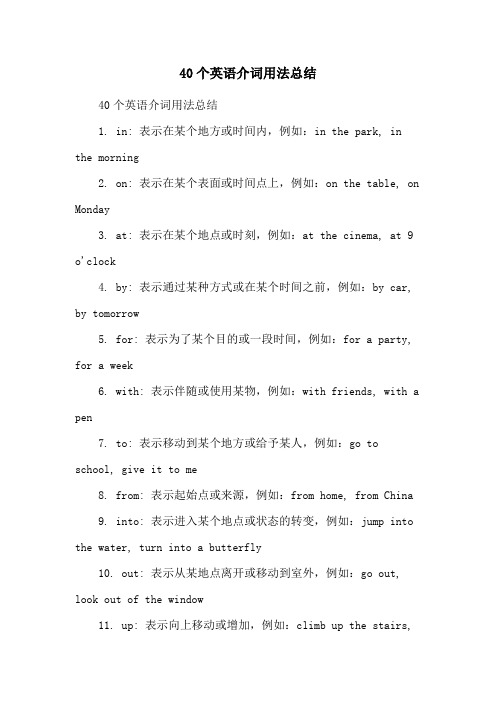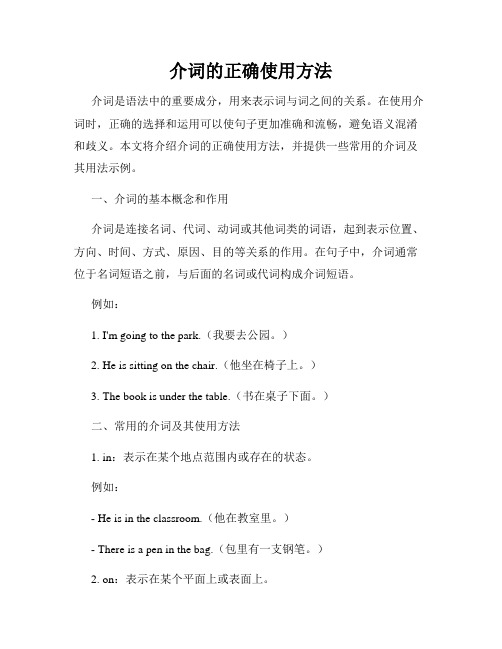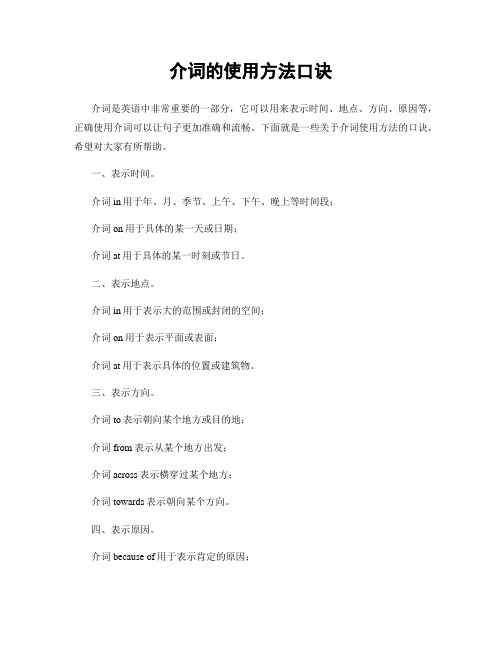介词的用法
40个英语介词用法总结

40个英语介词用法总结40个英语介词用法总结1. in: 表示在某个地方或时间内,例如:in the park, in the morning2. on: 表示在某个表面或时间点上,例如:on the table, on Monday3. at: 表示在某个地点或时刻,例如:at the cinema, at 9 o'clock4. by: 表示通过某种方式或在某个时间之前,例如:by car, by tomorrow5. for: 表示为了某个目的或一段时间,例如:for a party, for a week6. with: 表示伴随或使用某物,例如:with friends, with a pen7. to: 表示移动到某个地方或给予某人,例如:go to school, give it to me8. from: 表示起始点或来源,例如:from home, from China9. into: 表示进入某个地点或状态的转变,例如:jump into the water, turn into a butterfly10. out: 表示从某地点离开或移动到室外,例如:go out, look out of the window11. up: 表示向上移动或增加,例如:climb up the stairs,wake up12. down: 表示向下移动或减少,例如:walk down the hill, calm down13. about: 表示关于某事或在某个范围内,例如:talk about the movie, wander about the city14. off: 表示离开或关闭,例如:get off the bus, turnoff the lights15. on: 表示打开或激活,例如:turn on the TV, switch on the computer16. over: 表示越过或在某地上方,例如:jump over the fence, fly over the city17. under: 表示在某物下面或被控制或影响,例如:hide under the bed, live under his rules18. with: 表示具有某种特征或和某人一起做某事,例如:a man with blue eyes, dance with me19. without: 表示没有某物或在缺乏某物的情况下,例如:go without food, live without regret20. by: 表示通过某种方式,例如:learn by doing, go by bus21. through: 表示穿过某物或完成某事,例如:walk through the door, go through the documents22. across: 表示横穿某物或在某个范围内,例如:swimacross the river, all across the world23. between: 表示在两个事物之间或在某个时间段,例如:choose between two options, between 9 and 10 o'clock24. among: 表示在三个或三个以上事物之间或在某群人中,例如:share among friends, discuss among colleagues25. around: 表示在周围或在某个时间点附近,例如:walk around the park, around midnight26. through: 表示通过某事物或在某段时间内,例如:read through the book, work through the night27. against: 表示反对或靠在某物上,例如:fight against injustice, lean against the wall28. for: 表示代表或支持某人或某事,例如:vote for a candidate, fight for freedom29. towards: 表示朝向某个方向或对某人有好感,例如:walk towards the beach, feel towards someone30. within: 表示在某个时间或范围内,例如:arrive within an hour, within the city limits31. beyond: 表示超出某个界限或超过某个程度,例如:beyond expectations, beyond the horizon32. along: 表示沿着某个路线或伴随某人一起,例如:walk along the street, sing along with the song33. above: 表示在某物之上或高于某个程度,例如:flyabove the clouds, above average34. below: 表示在某物之下或低于某个程度,例如:swim below the surface, below freezing35. beside: 表示在某物旁边或和某人一起,例如:sit beside me, beside the lake36. near: 表示在某物附近或接近某个时间,例如:live near the beach, near the end37. past: 表示经过某个地点或在某个时间之后,例如:walk past the store, past midnight38. around: 表示在周围或大约某个数量,例如:look around the room, around 20 people39. after: 表示在某个时间之后或追求某人或某事,例如:after dinner, run after the dog40. before: 表示在某个时间之前或在某个事件之前,例如:before sunrise, before the meeting这些介词是英语中常用的一些基本介词,它们在表达地点、时间、方式等方面起到了重要的作用。
介词的常见用法及搭配

介词的常见用法及搭配介词在英语中起到连接词与词之间关系的作用,常用于表示时间、地点、原因、结果、方式等多种语境中。
本文将介绍介词的常见用法及其常见的搭配。
一、表示时间的介词:1. In:表示在某个特定的时间段或年代。
例:I will meet you in the evening.例:In the 1980s, disco music was popular.2. On:表示具体某一天或日期。
例:I have a meeting on Monday.例:We usually have a family dinner on Christmas Day.3. At:表示具体的时刻或某个特定时间点。
例:Let's meet at 9 o'clock.例:The concert starts at 7:30 pm.4. For:表示时间段的长度。
例:He has been living in Paris for five years.例:I will be on vacation for two weeks.二、表示地点的介词:1. In:表示在某个大范围的地点。
例:She lives in New York.例:They are studying in the library.2. On:表示在某个平面或具体的地点上。
例:The book is on the table.例:I saw her on the beach yesterday.3. At:表示在某个具体的地方或建筑物。
例:They are waiting at the bus stop.例:The party is at my house tonight.4. By:表示经过某个地点。
例:I go to work by bus every day.例:They traveled to the city by train.三、表示原因的介词:1. Because of:表示由于某个原因。
介词的正确使用方法

介词的正确使用方法介词是语法中的重要成分,用来表示词与词之间的关系。
在使用介词时,正确的选择和运用可以使句子更加准确和流畅,避免语义混淆和歧义。
本文将介绍介词的正确使用方法,并提供一些常用的介词及其用法示例。
一、介词的基本概念和作用介词是连接名词、代词、动词或其他词类的词语,起到表示位置、方向、时间、方式、原因、目的等关系的作用。
在句子中,介词通常位于名词短语之前,与后面的名词或代词构成介词短语。
例如:1. I'm going to the park.(我要去公园。
)2. He is sitting on the chair.(他坐在椅子上。
)3. The book is under the table.(书在桌子下面。
)二、常用的介词及其使用方法1. in:表示在某个地点范围内或存在的状态。
例如:- He is in the classroom.(他在教室里。
)- There is a pen in the bag.(包里有一支钢笔。
)2. on:表示在某个平面上或表面上。
例如:- The book is on the table.(书在桌子上。
)- She put the cup on the shelf.(她把杯子放在架子上。
)3. at:表示在某个具体地点。
例如:- I will meet you at the park.(我会在公园见你。
)- The concert will be held at the stadium.(音乐会将在体育场举行。
)4. by:表示通过某种方式或交通工具。
例如:- I went to work by bus.(我坐公交车去上班。
)- They communicate with each other by email.(他们通过电子邮件互相沟通。
)5. for:表示为了某个目的、时间段、利益等。
例如:- I bought a gift for my sister.(我给我姐姐买了一份礼物。
介词用法大全

介词用法大全(一)早、午、晚要用in,at黎明、午夜、点与分。
年、月、年月、季节、周,阳光、灯、影、衣、冒in。
将来时态in...以后,小处at大处in。
有形with无形by,语言、单位、材料in。
特征、方面与方式,心情成语惯用in。
介词at和to表方向,攻击、位置、恶、善分。
日子、日期、年月日,星期加上早、午、晚,收音、农场、值日on,关于、基础、靠、著论。
着、罢、出售、偷、公、假,故意、支付、相反,准。
特定时日和“一……就”,on后常接动名词。
年、月、日加早、午、晚,of之前on代in。
步行、驴、马、玩笑on,cab,carriage则用in。
at山脚、门口、在当前,速、温、日落、价、核心。
工具、和、同随with,具有、独立、就、原因。
就……来说宾译主,对、有、方状、表细分。
海、陆、空、车、偶、被by,单数、人类know to man。
this、that、tomorrow,yesterday,next、last、one。
接年、月、季、星期、周,介词省略已习惯。
over、under正上下,above、below则不然,若与数量词连用,混合使用亦无关。
‘beyond超出、无、不能,against靠着,对与反。
besides,except分内外,among之内along沿。
同类比较except,加for异类记心间。
原状because of,、 owing to、 due to表语形容词under后接修、建中,of、from物、化分。
before、after表一点, ago、later表一段。
before能接完成时,ago过去极有限。
since以来during间,since时态多变换。
与之相比beside,除了last but one。
复不定for、找、价、原,对、给、段、去、为、作、赞。
快到、对、向towards,工、学、军、城、北、上、南。
but for否定用虚拟,复合介词待后言。
ing型由于鉴,除了除外与包合。
介词的用法及常见短语

介词的用法及常见短语介词在英语中起着连接词与词之间关系的作用。
它们通常放在名词、代词或动词之后,用来表示位置、时间、方式、原因等。
正确使用介词对于准确表达意思非常重要。
在本文中,我们将探讨一些常见的介词及其用法。
一、表示位置的介词1. In:表示在某个地方或范围之内。
例如:in the park(在公园里)、in the box (在盒子里)。
2. On:表示在某个表面或位置上。
例如:on the table(在桌子上)、on the wall(在墙上)。
3. At:表示在某个具体的地点。
例如:at the cinema(在电影院)、at the office (在办公室)。
4. Under:表示在某物下面。
例如:under the bed(在床底下)、under the tree (在树下)。
5. Behind:表示在某物的后面。
例如:behind the door(在门后面)、behind the car(在车后面)。
二、表示时间的介词1. On:表示在某个具体的日期或星期几。
例如:on Monday(在星期一)、on April 1st(在4月1日)。
2. At:表示在某个具体的时间点。
例如:at 9 o'clock(在9点钟)、at noon (在中午)。
3. In:表示在某个时间段或季节。
例如:in the morning(在早晨)、in summer (在夏天)。
4. For:表示持续的时间。
例如:for two hours(持续两个小时)、for a week(持续一周)。
5. Since:表示从某个时间点开始。
例如:since yesterday(从昨天开始)、since 2010(从2010年起)。
三、表示方式的介词1. With:表示使用某种工具或伴随某人。
例如:write with a pen(用钢笔写)、go with me(和我一起去)。
2. By:表示通过某种方式或交通工具。
介词的常见用法及搭配

介词的常见用法及搭配介词在英语中具有非常重要的作用,它主要用于表达名词、代词、动词、形容词等语言成分之间的关系。
本文将介绍介词的常见用法及搭配,帮助读者更好地理解和运用介词。
一、表示方向和位置的介词1. in用于表示某物处于一个封闭或边界明确的区域内。
例如:- in the box(在盒子里)- in the park(在公园里)2. on用于表示某物位于另一物体的表面上。
例如:- on the table(在桌子上)- on the wall(在墙上)3. at用于表示某物所在的具体位置或地点。
例如:- at the bus station(在公交车站)- at the cinema(在电影院)4. above用于表示某物在另一物体的上方。
例如:- above the clouds(在云层之上)- above the door(在门上方)5. below用于表示某物在另一物体的下方。
例如:- below the surface(在水面下)- below the tree(在树下)6. between用于表示在两个或多个物体或地点之间。
例如:- between the buildings(在建筑物之间)- between two friends(在两个朋友之间)7. among用于表示在三个或三个以上的物体或人中间。
例如:- among the flowers(在花丛中)- among the students(在学生中)二、表示时间的介词1. at用于表示具体的时刻或某个特定时间点。
例如:- at 9 o'clock(在九点钟)- at Christmas(在圣诞节)2. on用于表示某个具体的日期或星期几。
例如:- on Monday(在星期一)- on January 1st(在一月一日)3. in用于表示一个时间段或季节。
例如:- in the morning(在早上)- in summer(在夏天)三、表示原因和目的的介词1. for用于表示某事的目的或原因。
介词的用法和意思

介词的用法和意思一、介词的基本概念及作用介词是英语中非常重要的一类词性,可以用来引导短语,帮助语言实现更准确、丰富的表达。
作为一种连接词,它可以在句子中起到连接名词、代词、动词等不同成分的作用。
下面我们将详细介绍介词的用法和意思。
二、表示时间的介词1. at:表示具体时间点或某个时刻(如at 9 o'clock,在九点钟)。
例句:I usually have dinner at 7 o'clock.(我通常在7点钟吃晚餐。
)2. in:表示较长时间段或将来某个时间(如in three days,三天后;in the morning,在早晨)。
例句:He will arrive in two weeks.(他将会在两周后到达。
)3. on:表示星期几或具体日期(如on Monday,在星期一;on May 1st,在五月一号)。
例句:We have a meeting on Friday.(我们星期五有个会议。
)三、表示地点的介词1. in:表示大范围地理位置(如in China,在中国;in the city,在城市里)。
例句:She lives in New York City.(她住在纽约市。
)2. at:表示小范围地理位置(如at the park,在公园里;at the bus stop,在车站)。
例句:I met her at the airport.(我在机场遇见了她。
)3. on:表示具体表面(如on the table,在桌子上;on the wall,在墙上)。
例句:The book is on the shelf.(书在书架上。
)四、表示方式的介词1. by:表示通过某种方式或交通工具(如by car,乘坐汽车;by email,通过邮件)。
例句:I usually go to work by subway.(我通常乘坐地铁去上班。
)2. with:表示使用某物或与某人一同完成某事(如with a pen,用钢笔;with my friends,和我的朋友一起)。
介词的使用方法口诀

介词的使用方法口诀介词是英语中非常重要的一部分,它可以用来表示时间、地点、方向、原因等,正确使用介词可以让句子更加准确和流畅。
下面就是一些关于介词使用方法的口诀,希望对大家有所帮助。
一、表示时间。
介词in用于年、月、季节、上午、下午、晚上等时间段;介词on用于具体的某一天或日期;介词at用于具体的某一时刻或节日。
二、表示地点。
介词in用于表示大的范围或封闭的空间;介词on用于表示平面或表面;介词at用于表示具体的位置或建筑物。
三、表示方向。
介词to表示朝向某个地方或目的地;介词from表示从某个地方出发;介词across表示横穿过某个地方;介词towards表示朝向某个方向。
四、表示原因。
介词because of用于表示肯定的原因;介词due to用于表示中性的原因;介词owing to用于表示正式的原因;介词thanks to用于表示积极的原因。
五、其他常用介词。
介词by表示通过某种方式或工具;介词with表示伴随或使用某物;介词for表示为了某种目的或代表某人。
六、特殊用法。
介词in、on、at在特定搭配中有特殊用法,需要根据具体情况进行记忆和理解。
七、总结。
介词的使用方法口诀并非一成不变,需要根据具体语境进行灵活运用。
通过大量的阅读和实践,逐渐掌握介词的用法是非常重要的。
以上就是介词的使用方法口诀,希望对大家有所帮助。
在学习英语的过程中,多多积累、多多练习,相信大家一定能够掌握好介词的使用方法,写出更加地道和流畅的英语句子。
- 1、下载文档前请自行甄别文档内容的完整性,平台不提供额外的编辑、内容补充、找答案等附加服务。
- 2、"仅部分预览"的文档,不可在线预览部分如存在完整性等问题,可反馈申请退款(可完整预览的文档不适用该条件!)。
- 3、如文档侵犯您的权益,请联系客服反馈,我们会尽快为您处理(人工客服工作时间:9:00-18:30)。
Exceo there every day except Sunday. • Your composition is good except for a few spelling mistakes.
Beside & besides
• There is a small house beside the river. • There are in china over fifty nationalities besides the Hans.
Since & for
• The family has been in America ___ last year. • A. in B. for C. after D. since • Doctoral students who are preparing to take their qualifying examinations have been studying in the library every night ___ the last three months. • A. since B. before C. until D. for
Like & as
• He fought like a mad man. • Can you pour wine straight down your throat, as they do in Spain? • I worked as a slave. (I was a slave) • I worked like a slave. (I worked very hard; but I was a free man.)
Between, among & amid
• Early man did not know how to explain the difference ___ gases, solids and liquids. • A. among B. between C. about D. amid • A child’s doll was found amid the wreckage of the plane. • the pilot and the crew divided the life preservers among the twenty frantic passengers.
After & in
• Come and see me ___ two day’s time. • A. for B. in C. after D. during • I got it done ___three weeks of hard work. • A. after B. during C. in D. for
By, with & through
• All sewing was done by hand until the invention of sewing machine in the 19th century. • Nearly all of the practising doctors of today were brought up with Osler’s medical textbooks. • It’s remarkable how much a scientist can learn about the structure and history of the moon through a sample of lunar soil.
Owing to, due to, because of & because
• Because of /owing to the meat boycott, the butchers were doing about half of the business that they were doing previous to the boycott. • The force due to gravitation causes objects to have weight. • He arrived late owing to / due to the heavy snowstorm.
Despite & in spite of
• ________ the advances of science, the discomforts of old age will no doubt always be with us. A. As for B. Besides C. Except D. Despite • Many people still have trouble sleeping _____ of the pills which are available. • A. beside B. in spite C. except D. despite
